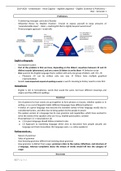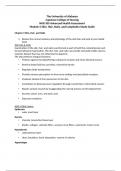Resume
Samenvatting Engels grammatica en taalbeheersing
- Établissement
- Universiteit Antwerpen (UA)
- Book
- Improve Your Grammar
Samenvatting bij het vak Engels: Grammatica & Taalbeheersing - Bevat de powerpoints, notities uit de lessen en het handboek Improve Your Grammar - Toegepaste Taalkunde - BA2 - Semester 1 - UAntwerpen - Anna Gagiano -
[Montrer plus]





